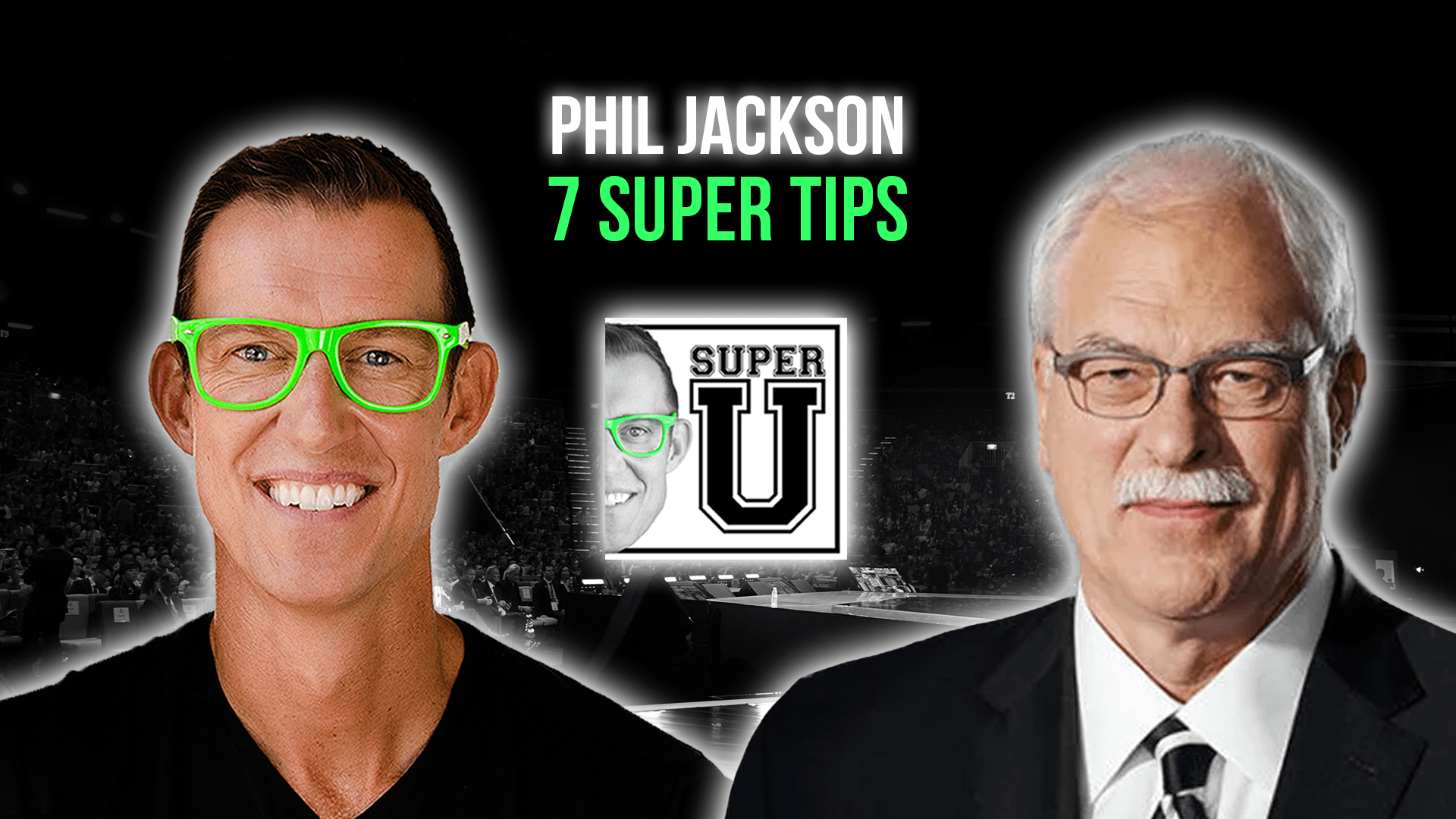Super U Podcast | 7 Super Tips | Phil Jackson
Today’s game-plan: 7 Super Tips from the one and only, Philip Jackson. Jackson discuss balancing success and failure, the power of goodwill, and following your intuitive nature. Jackson is an American former professional basketball player and coach. A power forward, Jackson played 12 seasons in the NBA, winning NBA championships with the New York Knicks in 1970 and 1973. Jackson was the head coach of the Chicago Bulls from 1989 to 1998, leading them to six NBA championships. He then coached the Los Angeles Lakers from 1999 to 2004 and again from 2005 to 2011; the team won five league titles under his leadership. Jackson’s 11 NBA titles as a coach surpassed the previous record of nine set by Red Auerbach. Jackson is the author of several candid books about his teams and his basketball strategies. In 2007, Jackson was inducted into the Basketball Hall of Fame. Jackson retired from coaching in 2011 and joined the Knicks as an executive in March 2014.
5x #1 Bestselling Author and Motivational Speaker Erik Qualman has performed in over 55 countries and reached over 50 million people this past decade. He was voted the 2nd Most Likable Author in the World behind Harry Potter’s J.K. Rowling. Qualman is also the inventor of the bestselling board game Kittycorn.
Need a sneak peek? Below are the main takeaways from the episode.
Super U Podcast | 7 Super Tips | Phil Jackson
Tip #1
“You know, I think you have to be a salesman, when you’re coach, you have to be able to talk about the good of the whole, but you have to be able to convince them that this is something that’s good for the team. Maybe it’s not just good for one person. And I think a lot of coaches coach because it’s good for one person and because that person’s where they put all their trust in. And I think when the players know that he it’s not just about you know, getting Michael Jordan the ball 25 times a game so that he can score 3540 points. It’s about this team having the best feeling about it. players seem to play a lot better if they can touch the ball and if they can have a chance to shoot once in a while, even if they’re, you know, we’re not there.”
Tip #2
“You know, as much as we pump iron, we want to build our strength up, we need to build our mental strength up. We need to build our mental strength so we can focus, get one-pointed attention, and so that we can be in concert with one another in times of need. When you come off the court, you had a bad call, talked about mindfulness as being you know, as much as we pump iron and we run to build our strength up, we need to build our mental strength up. We need to build our mental strength so we can focus and get one-pointed attention and so that we can be in concert with one another in times of need. There was there were hiccups along the way without a doubt, but as far as being willing learners with open minds. They’re very accommodating to me and I’m very gracious. I’m glad about that.”
Tip #3
“In sports, a lot of teaching moments where players are either on the high side or maybe on the low side of what has happened on the court. As a coach, you can always kind of bring them right back to the middle row. That was kind of what my process was, is to make sure that there’s not too high or not too low as a standing, nothing’s going to be that bad. And nothing’s that great. In basketball, you’re only a success for the moment you do a successful act. So these acts have to be repeated all the time. So your job rooms about one successful actor one successful game, or one successful season are only a success at that time. You got to repeat it or you got to do the same thing again and again, and again.”
Tip #4
“A lot of its intuitive. Who is at Indy Jones, who’s in one of his Indiana Jones, one of his films, Steven Spielberg guy was asked, What are we going to do next? And he says, I don’t know. I’m just going by feel here. And that’s, that’s kind of the way it is the times that you have to follow your intuitive nature. It’s about being attuned to your inner voice and being at peace with it. And in doing so, learning to lead from the inside out. You don’t learn leadership skills, I think from other people. I’ve gotten a lot of books sent to me about leadership, I think management in has, you know, loads of books about leadership that people read, and they can pick up ideas from those. But if you’re not authentic, or who you really are, people see through that pretty quickly and especially ballplayers.”
Tip #5
“We always have this statement, you can’t change the spots on a leopard. As much as you want a player that shows some talent to do something you want to do on your team. You have to look at what he really is and what it’s really about and use his attributes for what it is. And so that was a lesson learned early on in my career, and I was happy to learn that because that’s one of the things that everybody is a coach things that my coaching will help this guy around along a whole lot. But a lot of times it’s about what can he do inside of what is a skill that can fit inside of our team-free framework that is going to help him and how can he manifest his best skills when he does that when he submits to the system and learns how to play.”
Tip #6
“So as the youngest child, I had to really scurry to kind of meet up with older brothers, and a mother who was very competitive. So I always joke around the family that you know, when you play the mum memory game, you know what those little cards that you turned over that you you know that my mom would be four-year-old kids because she was so competitive. But it was kind of bred in this competitive nature. And as a process things, I was always on winning teams, a successful athlete growing up, and I was very fortunate to enjoy that. And it wasn’t until my last years in the NBA that I went to the New Jersey Nets for a couple of years and was on the losing team. So it was a great run for me, both in that nature. And to be honest with you, I wasn’t the best player. I wasn’t even a starter. A lot of times I did start at games or so in my career, but I was just fortunate to be in winning situations. And I think that winning becomes habitual and it becomes a motivating factor. When you get a taste for it, you want to continue to do it. And anything less than that is a failure.”
Tip #7
“You know, you think about a battle guy goes out, it’s raining that day, wow, everything goes to pot, you know, you just call your plan is changed. And directly you’re dealing with mud instead of, you know, whatever, all these things that can go wrong in a battle plan. And that’s kind of the way it is in sports in a lot of ways that all these things have to kind of work together to flow. And I used to get letters a lot from retired. Well, nuns from their retirement homes. And while we’re praying for you, and we watch the games, there are 12 of us here in this community. This is one group that wrote me and I was like, Oh, wow, I didn’t understand how much I covered prayer. That the fact that people want you to succeed is such a big part of what you do. And when I came to LA, and I go to Whole Foods or whatever grocery store, people come up and tell me I’m so glad you came. I’m so glad that you decided to come and coach the Lakers and I was like, wow, with that kind of a feeling. We have to be successful. It’s just there just so much goodwill flying our way.”
Click here to subscribe and listen to the full episode.

To ensure you don’t miss future episodes, subscribe to our podcast by clicking here >> Super U Podcast. We hope these tips help unlock and unleash your inner superpower!
The Super U Podcast is hosted by #1 bestselling author and Motivational Speaker Erik Qualman.





